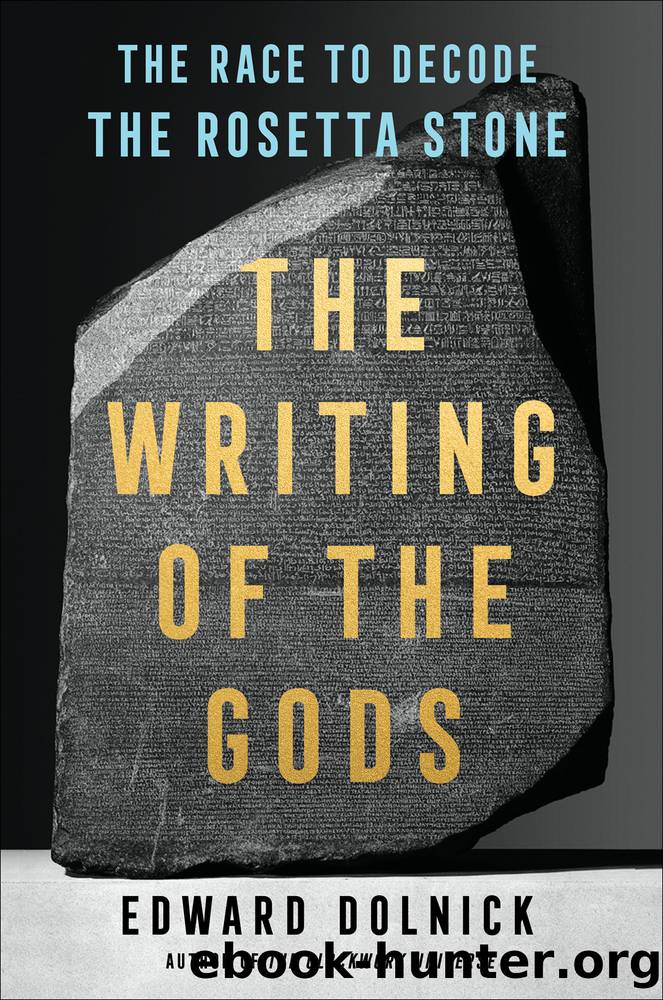The Writing of the Gods by Edward Dolnick

Author:Edward Dolnick
Language: eng
Format: epub
Publisher: Scribner
Published: 2021-10-19T00:00:00+00:00
* * *
Champollion was far less likely than Young to be undone by a typo, because his focus on Egypt was so relentless. Young always had a dozen pressing projects on his mind. âHe long retained the habits of a schoolboy in mixing his studies,â he wrote about himself (in the third-person voice he favored), âso as to devote an hour or two only at a time to each.â At the time the Cleopatra cartouche turned up, he had just taken on a major assignment that involved revising and reassessing a vast trove of nautical and astronomical data for a publication called The Nautical Almanac.
His all-things-considered approach had its risks, Young acknowledged. Perhaps he could have accomplished more by âconfining his talents within narrower limits.â But no sooner had he raised this possibility than he rejected it. On second thought, he decided, the habit of hopping from subject to subject had granted him âa versatility of powers.âI
More important, Young went on, life confined to ânarrow limitsâ bore a strong resemblance to life stuck in a rut. He sympathized, he wrote, with workmen who resisted the call to break a job into tiny tasks for the sake of efficiency. For a thinker as for a manual worker, specialization was a formula for âreducing his dignity in the scale of existence from a reasoning being to a mere machine.â
Champollion presumably saw the Cleopatra typo that had thrown Young off his game. He proceeded ahead nevertheless, too hopeful to blanch at a trifle. He quickly found new confirmation for his deciphering strategy.
Once again a foreign rulerâs name provided the key. Xerxes was the formidable Persian king who had invaded Greece in 480 BC. His was a name familiar to scholars. The ancient world had cowered before Xerxesâhe rode at the head of a two-million-man army (according to Herodotus), the largest military force that anyone had ever assembled.
Champollion suggested to another French linguist, an expert on cuneiform, that the two of them look at a particular vase in a private collection. The lure was plainâthe vase was ancient, and it carried inscriptions in two different scripts, Persian cuneiform and Egyptian hieroglyphs. Scholars had already learned a bit about deciphering cuneiform. They could read the first Persian word on the vaseâXerxes. Now to the Egyptian, which began with a cartouche. Champollion recognized its hieroglyphs from other names and sounded them out: Xerxes!
That was a breakthrough, but Champollion still had not seen what it might mean (and certainly Young had not). Yes, certain hieroglyphs stood for sounds and could be used to spell out names. You could even assemble them into a sort of alphabet. But then what? âIt is abundantly clearâ¦,â writes the classics scholar Maurice Pope, âthat he never suspected that his alphabet would have any application beyond the sphere of proper names and foreign words, or that it was going to prove the long-looked-for key to the hieroglyphs.â
Having advanced so far only to find himself still lost, Champollion sputtered in frustration. âThe look of a hieroglyphic inscription is a veritable chaos.
Download
This site does not store any files on its server. We only index and link to content provided by other sites. Please contact the content providers to delete copyright contents if any and email us, we'll remove relevant links or contents immediately.
Harry Potter and the Goblet Of Fire by J.K. Rowling(3024)
Unfinished: A Memoir by Priyanka Chopra Jonas(2911)
Never by Ken Follett(2871)
The Man Who Died Twice by Richard Osman(2289)
Machine Learning at Scale with H2O by Gregory Keys | David Whiting(2263)
Fairy Tale by Stephen King(2058)
Will by Will Smith(2032)
Rationality by Steven Pinker(1760)
The Storyteller by Dave Grohl(1656)
The Dawn of Everything: A New History of Humanity by David Graeber & David Wengrow(1564)
The Dark Hours by Michael Connelly(1562)
The Stranger in the Lifeboat by Mitch Albom(1528)
Cloud Cuckoo Land by Anthony Doerr(1428)
The Becoming by Nora Roberts(1323)
Friends, Lovers, and the Big Terrible Thing by Matthew Perry(1321)
Crying in H Mart by Michelle Zauner(1312)
Einstein: His Life and Universe by Walter Isaacson(1311)
New Morning Mercies: A Daily Gospel Devotional by Paul David Tripp(1301)
A Short History of War by Jeremy Black(1295)
